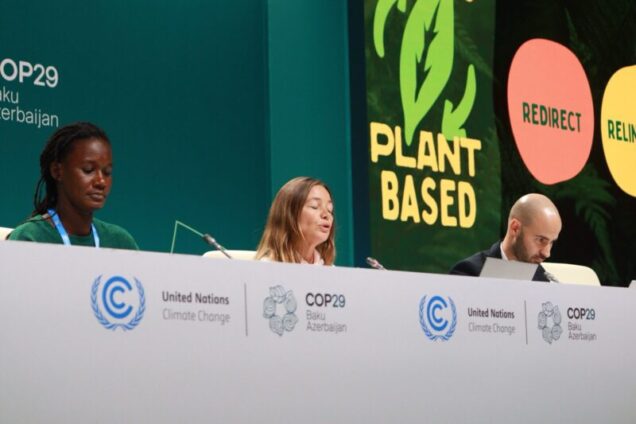A total of 33 cities, including Los Angeles, Amsterdam, and Edinburgh, have backed a call for a global Plant-Based Treaty, aiming to align the food system with the Paris Agreement and encourage the adoption of plant-based food policies at the local level.
Additional cities supporting the initiative include Tavira (Portugal), Didim (Turkey), Rainbow Lake (Canada), and several in the United Kingdom, such as Belfast, Exmouth, Haywards Heath, Lambeth, and Norwich.
In India, 16 cities have joined the movement, including Ahmedabad, Mundra, Rajkot, and Cadodara. In Africa, two cities are featured: Manduar in The Gambia and Kyotera in Uganda.
Plant-Based Treaty advocates Enric Noguera and Cindy Veltens introduced “Plant-Based Treaty in Action” to showcase how cities worldwide have begun implementing the 40 recommended proposals from the treaty.
“We need a global treaty and international cooperation to scale up plant-based solutions,” says Cindy Veltens, Plant-Based Treaty campaigner for Belgium and The Gambia.
During a press conference marking the opening of COP29, case studies from Edinburgh and Amsterdam were highlighted.
Edinburgh, which endorsed the Plant-Based Treaty in 2023, is implementing carbon labelling in schools and universities.
Meanwhile, Amsterdam, which signed the treaty in 2024, plans to partner with major employers and public institutions—including hospitals, community centres, and care facilities—to introduce Vegan Fridays and work toward a 60/40 plant-based-to-animal protein ratio by 2030.
“We urge world leaders to start negotiating a Plant-Based Treaty at COP29, and we need cities and countries to act on it and work on implementation,” says Enric Noguera, Plant-Based Treaty Europe cities campaigner.
Dr. Anita Krajnc, Global Campaign Director of the Plant-Based Treaty, emphasized that the demand at COP29 is clear: food policy is 30 years behind energy policy, and it’s time for the world to begin negotiations for a global Plant-Based Treaty.
According to Dr Krajnc, the treaty would complement the UN Paris Climate Agreement and help tackle one-third of global greenhouse gas emissions stemming from food systems.
“It will further protect our planetary boundaries by guiding the human community back to plant-based food systems,” says Dr Anita Krajnc, Global Campaign Director of the Plant-Based Treaty.
Latest Stories
-
Prof Opoku-Agyemang condemns gov’t for supplying ‘expired’ rice to SHS
3 mins -
‘Expired rice’: FDA fines Lamens Investments GH¢100k for regulatory violations
7 mins -
No student has been served unwholesome meals – Nana Boakye
21 mins -
Galamsey has left our river deities powerless – Fetish Priest laments
35 mins -
It was unfair to destroy Leslie’s Fantasy Dome – Okraku-Mantey
40 mins -
Expired rice scandal: We won’t jeopardize people’s health or safety for any reason – FDA
44 mins -
UniMAC to host public forum on democracy and communication
1 hour -
Expired Rice Scandal: Ablakwa slams Lamens Company for “Criminal” acts
1 hour -
Avoid the use of vituperative expressions in your campaigns – NCCE
1 hour -
No petroleum revenue allotment to industrialisation in first half of 2024 – PIAC report
1 hour -
Baba Sadiq motivated me to vie for MP position – Okraku-Mantey
2 hours -
“Black Stars failure to qualify for AFCON 2025 a big blow” – Ibrahim Tanko
2 hours -
NPP’s campaign is going very well – Nana Akomea
2 hours -
Employees must file annual income tax returns – Ghana Revenue Authority
3 hours -
L’AINE HR launches 30th-anniversary celebration with sports day
3 hours

